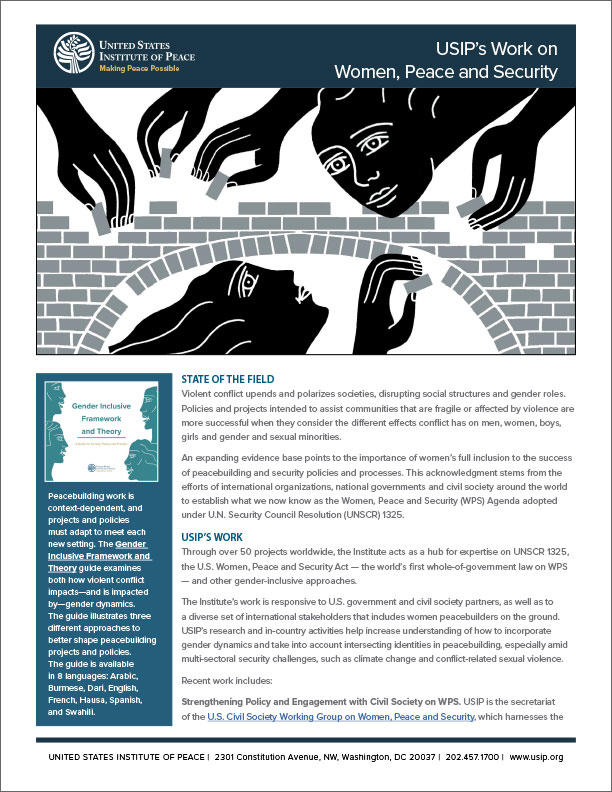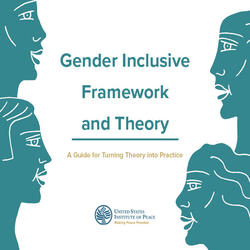A USIP Fact Sheet
Violent conflict upends and polarizes societies, disrupting social structures and gender roles. Policies and projects intended to assist communities that are fragile or affected by violence are more successful when they consider the different effects conflict has on men, women, boys, girls and gender and sexual minorities.
USIP's Work
Through over 50 projects worldwide, the Institute acts as a hub for expertise on UNSCR 1325, the U.S. Women, Peace and Security (WPS) Act — the world’s first whole-of-government law on WPS — and other gender-inclusive approaches.
The Institute’s work is responsive to U.S. government and civil society partners, as well as to a diverse set of international stakeholders that includes women peacebuilders on the ground. USIP’s research and in-country activities help increase understanding of how to incorporate gender dynamics and take into account intersecting identities in peacebuilding, especially amid multi-sectoral security challenges, such as climate change and conflict-related sexual violence.
Recent work includes:
Strengthening Policy and Engagement with Civil Society on WPS
USIP is the secretariat of the U.S. Civil Society Working Group on Women, Peace and Security, which harnesses the expertise of over 65 NGOs with programs around the world. In this role, USIP is a principal convenor of consultations between civil society and the U.S. government on the implementation of the U.S. National Strategy on Women, Peace and Security. This includes direct engagement with the Department of Defense and other U.S. agencies.
Securing Women’s Participation in Peacebuilding
The COVID pandemic, climate change and conflicts both old and new are challenging recent progress for women. In this context, USIP builds on years of work to support inclusive and safe participation in peacebuilding for women from all backgrounds. This includes educating the public and policymakers through events and symposia on protecting the participation of women peacebuilders as they face heightened risks; identifying factors that facilitate women’s local leadership; and supporting women peacebuilders who act as mediators, leaders of nonviolent movements and religious leaders around the world.
In 2020, USIP established the Women Building Peace Award to highlight and amplify the essential work of women peacebuilders in fragile and conflict-affected countries. The award annually honors one woman peacebuilder who has made a substantial contribution to the pursuit of peace and security in her community or country.
To prevent violent extremism in East Africa and the Sahel, USIP supports women’s capacity, agency and influence that help to break down barriers to participation, enable networks of women to lead in their local communities, and facilitate connections with local and national policy actors to affect change.
International research demonstrates that men are not inherently violent, and USIP’s “peaceful masculinities” efforts include collaborating with security actors to promote a more expansive narrative about men by challenging masculine identities that favor violence to solve problems.
Addressing Conflict-Related Sexual Violence
By connecting multi-disciplinary research to practice, USIP amplifies scholarship on some of the most challenging issues on gender and peacebuilding.
Since 2013, USIP has convened the Missing Peace Initiative Scholars Network, which comprises international researchers who analyze and help to address sexual violence in some of the world’s most turbulent places. USIP brings these scholars together annually to identify gaps in knowledge and to make recommendations to policymakers.
USIP experts apply this knowledge to support policy and programming that takes into account the needs of survivors, to address gaps in early conflict and atrocities warning mechanisms, and to train key security and peacekeeping personnel.
USIP’s research on conflict-related violence bridges key policy areas, including national security, global fragility, atrocities prevention, gender-based violence and women, peace and security.
Peacebuilding work is context-dependent, and projects and policies must adapt to meet each new setting. The Gender Inclusive Framework and Theory guide examines both how violent conflict impacts—and is impacted by—gender dynamics. The guide illustrates three different approaches to better shape peacebuilding projects and policies. The guide is available in eight languages: Arabic, Burmese, Dari, English, French, Hausa, Spanish and Swahili.

